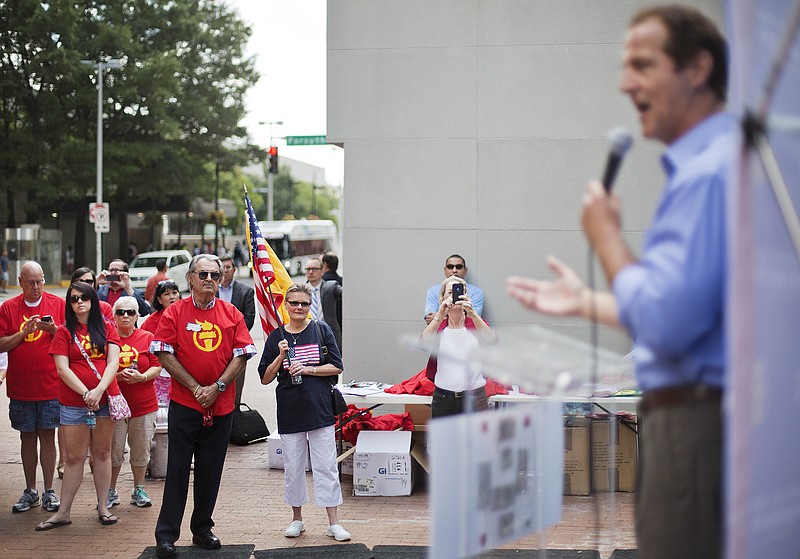ATLANTA (AP) - In the Republican-heavy Southeast, critics said Tuesday that a plan by President Barack Obama's administration to cut pollution would raise electricity prices, result in job losses and may not significantly curtail the carbon emissions blamed for global warming.
The criticism came as the U.S. Environmental Protection Agency held the first of two days of public hearings in Atlanta, Denver and Washington on the plan, which would force a 30 percent cut in carbon dioxide emissions from power plants by 2030 from levels seen in 2005. Federal officials have never before tried to restrict carbon dioxide emissions from existing power plants.
For critics, the hearings in Atlanta and Denver offered a chance to attack the proposed rules in states that are heavily Republican or historically dependent on coal mining and coal-burning power plants. Coal usage is already falling in some states. Georgia, for example, once produced more than half of its electricity from coal-fired plants, according to data from the U.S. Energy Information Administration. But coal produced just over a third of the state's energy in April.
Electric utilities have already started decreasing their reliance on coal because of earlier environmental rules and because natural gas is so cheap.
"Please leave us alone," said Georgia utility regulator Lauren "Bubba" McDonald, a Republican. "We set these goals ourselves, and we know how to achieve them."
Alabama Attorney General Luther Strange, a Republican, called for the EPA to withdraw its rule. Mines in northern Alabama produce bituminous coal that is burned at power plants, used in industrial facilities and exported to Europe and South America. Like Georgia, gas-fired power plants have gradually caught or surpassed coal plants.
"Congress did not intend the Clean Air Act to have such far-reaching consequences," Strange said.
The plan will likely mark one of Obama's biggest efforts in the final years of his presidency. Blocked from passing major climate change legislation in Congress, Obama has resorted to using executive authority under existing law to limit pollution. The cost of complying with the pollution rules is small compared to the damage inflicted by severe weather brought on by global warming, said Jim Doyle, president of Business Forward and a former Commerce Department official in the Clinton administration.
Doyle said a severe storm that shuts down an auto manufacturer in the Southeast costs more than $1 million an hour.
"Over the past four years, American factories have been disrupted by typhoons in Thailand, hurricanes in the Gulf of Mexico, droughts in Texas, tornadoes in Kentucky, falling water levels across the Great Lakes and flooding in the Northeast," he said.
The conflict does not split evenly across partisan lines. Former administrators of the EPA under Republican presidents recently testified that more action is needed on global warming. Meanwhile, interest groups typically aligned with Democrats have split from Obama's plan. Alabama AFL-CIO President Al Henley said the economic cost of shuttering U.S. coal-fired plants was not worth the benefits since the worldwide carbon emissions blamed for global warming are unlikely to decrease.
"Why jeopardize so many jobs when the EPA efforts will have so little effect on global carbon emissions?" Henley said at a news conference. "For every coal plant ... closed in in the U.S., several more open in developing countries like India and China."
Mississippi state Sen. Kenneth Wayne Jones, a Democrat who chairs his state's Legislative black caucus, also faulted the plan for potentially raising electricity bills, particularly on low-income consumers.
"They simply can't afford it," he said. "I already watch them talking about whether they can get money, whether they can get food, medicine."
Another hearing is scheduled Thursday and Friday in Pittsburgh.
___
Follow Ray Henry on Twitter: http://twitter.com/rhenryAP.
